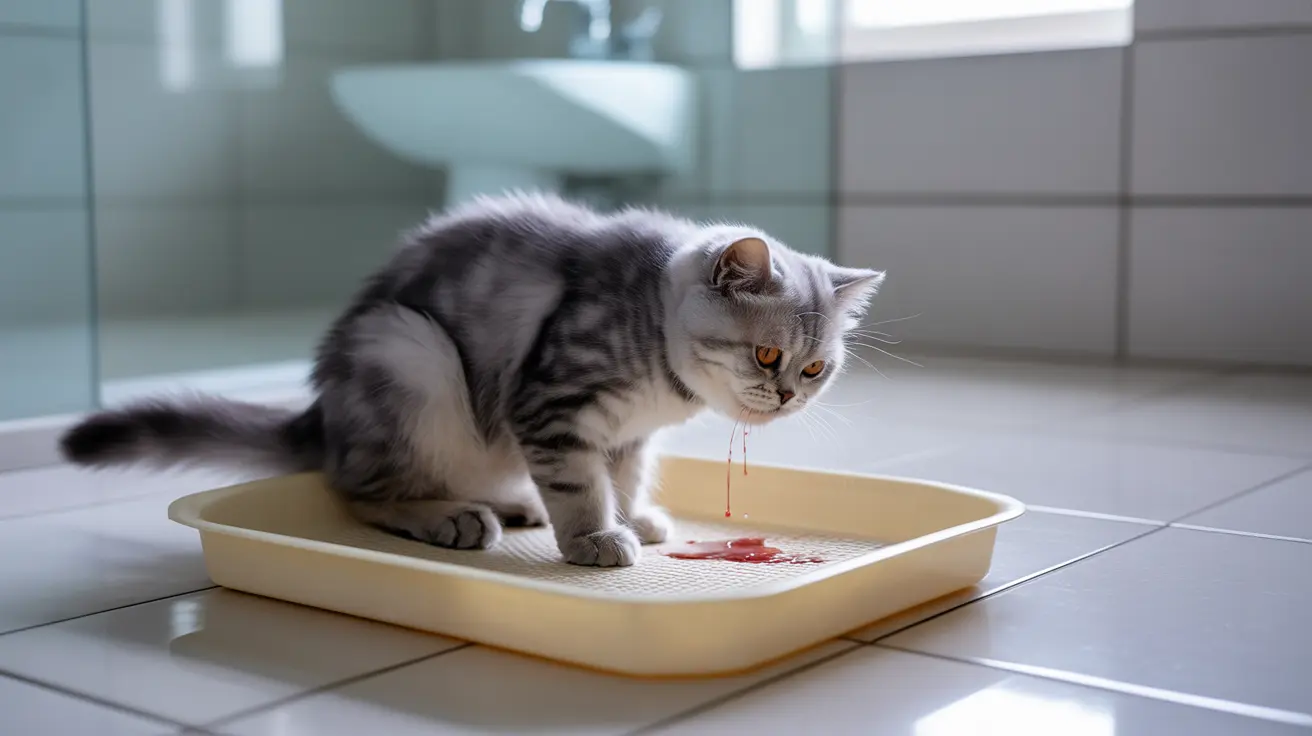If you notice your cat peeing blood, it's a concerning symptom that requires immediate attention. Known medically as hematuria, blood in cat urine can indicate various underlying conditions ranging from mild inflammation to serious medical emergencies. Understanding the causes, symptoms, and treatment options is crucial for every cat owner.
This comprehensive guide will help you understand why cats may pee blood, what steps to take, and when to seek emergency veterinary care. Quick action could be essential in protecting your feline friend's health and preventing serious complications.
Common Causes of Blood in Cat Urine
Feline Idiopathic Cystitis (FIC)
FIC is one of the most frequent causes of blood in cat urine, particularly in cats under 10 years old. This inflammatory condition of the bladder is often triggered by stress, obesity, or insufficient water intake. Cats living in multi-pet households or experiencing environmental changes are particularly susceptible.
Urinary Tract Issues
Bladder stones and crystals can cause irritation and bleeding in the urinary tract. While urinary tract infections (UTIs) are less common in cats compared to dogs, they do occur, especially in older or female cats. These conditions often require specific medical intervention and dietary changes.
Serious Medical Conditions
More severe causes include kidney disease, tumors, or blood clotting disorders. These conditions typically show additional symptoms beyond blood in the urine and require immediate veterinary attention for proper diagnosis and treatment.
Warning Signs to Watch For
Beyond visible blood in urine, watch for these critical symptoms:
- Frequent attempts to urinate with little output
- Crying or vocalization during urination
- Excessive licking of the genital area
- Urinating outside the litter box
- Lethargy or loss of appetite
- Complete inability to urinate (a medical emergency)
Treatment Options and Management
Immediate Care
If you notice your cat peeing blood, document when you first observed it and any accompanying symptoms. This information will help your veterinarian determine the best course of action. Never wait to seek care if your cat shows signs of urinary blockage, especially in male cats.
Long-term Management
Treatment varies based on the underlying cause but may include:
- Prescription medications for pain and inflammation
- Special diets to prevent crystal formation
- Increased water intake through wet food or fountains
- Stress reduction techniques
- Regular veterinary check-ups
Prevention Strategies
While not all causes of blood in cat urine are preventable, these steps can help reduce risk:
- Maintain clean, accessible litter boxes
- Provide fresh water in multiple locations
- Feed appropriate, veterinary-recommended diets
- Keep your cat at a healthy weight
- Minimize environmental stress
- Schedule regular veterinary check-ups
Frequently Asked Questions
Why is my cat peeing blood, and what are the most common causes?
The most common causes include feline idiopathic cystitis (FIC), bladder stones, urinary tract infections, and stress-related inflammation. Less common but serious causes can include tumors, kidney disease, or blood clotting disorders.
How can I prevent blood in my cat's urine at home?
Prevention includes ensuring adequate water intake, maintaining clean litter boxes, feeding appropriate diets, reducing stress, and keeping your cat at a healthy weight. Regular veterinary check-ups can help catch potential issues early.
What are the symptoms of urinary tract infections in cats, and how are they treated?
Symptoms include frequent urination attempts, straining, crying while urinating, and blood in urine. Treatment typically involves antibiotics based on urine culture results, along with pain management if needed.
Can stress cause blood in a cat's urine, and how can I reduce stress for my cat?
Yes, stress is a common trigger for FIC and blood in urine. Reduce stress by maintaining routine, providing multiple resources (litter boxes, food bowls, scratching posts), and creating safe spaces for your cat to retreat.
When should I seek emergency veterinary care if I notice blood in my cat's urine?
Seek immediate emergency care if your cat cannot urinate, shows signs of extreme pain, has continuous bleeding, or appears lethargic. Male cats with urinary symptoms should always be treated as an emergency due to their risk of life-threatening blockages.






